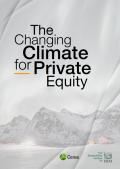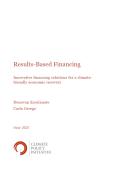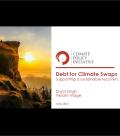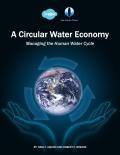
Over the last two decades, private equity has outperformed other asset classes while growing tremendously, adding $US trillions in assets under management. Based on its recent returns and scale, private equity is more attractive and more influential than ever before. The Changing Climate for Private Equity, a joint research project between the SustainAbility Institute by ERM (the SustainAbility Institute) and Ceres, seeks to understand how deeply climate-related expertise is embedded within private equity firms and to explore what climate performance expectations they impose on the companies in which they invest.

By linking financial rewards to climate objectives, Results-based Finance (RBF) enables innovative financing arrangements that can accelerate funding from the private sector. RBF interventions are well suited to target sectors most affected by COVID-19 while reducing risk and pressure for public spending. This report assesses the potential for Results-based Finance (RBF) to expand postCOVID-19 recovery funds while improving sustainability efforts.

The COVID-19 pandemic has worsened the debt vulnerabilities of many low- and medium-income sovereigns. Debt levels were already high for many even prior to the COVID-19 outbreak, but are now exacerbated because government revenues have declined as a result of limited economic activity – while the timing and the quantum of debt servicing payments remain the same. This report suggests the eligibility and condition criteria, principles for using proceeds from swaps, and offer concrete opportunities for using the redirected flows in select countries to address mitigation through examples such as accelerated coal power retirement, increased energy efficiency adoption, and adaptation and nature-based solutions to enhance resilience.

This publication features several case studies around the world where nature-based technologies are being employed to manage the human water cycle.
The Ministry of Mining of Ecuador, with PAGE support, identified an opportunity to apply a TSA study to assess and improve artisanal and small-scale mining practices by implementing the Responsible Mineral Processing (RMP) approach to increase the profitability of the gold supply chain. This alternative approach also provides options for improving government regulations.
